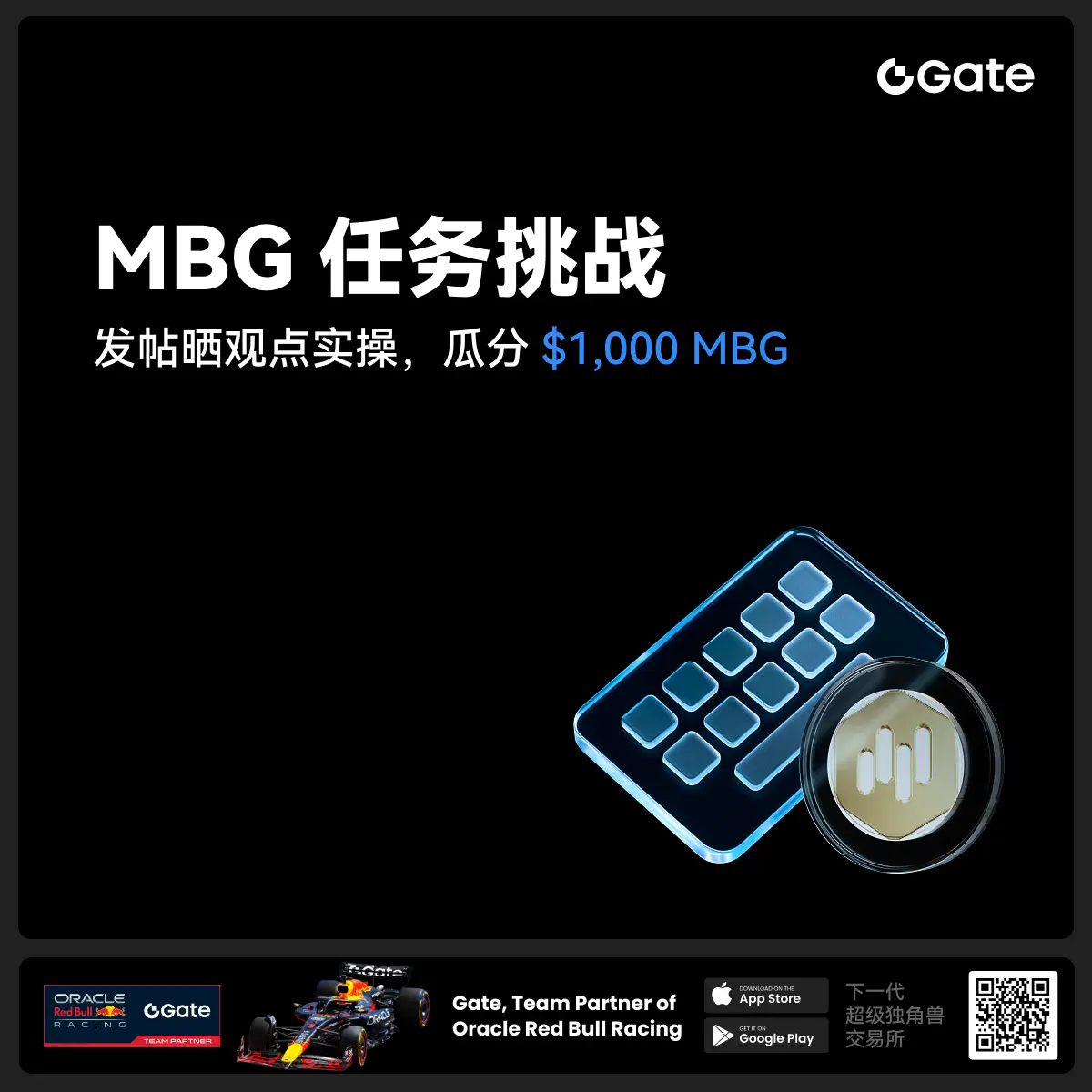- 話題1/3
16k 熱度
23k 熱度
18k 熱度
54k 熱度
20k 熱度
- 置頂
- 📢 Gate廣場 #MBG任务挑战# 發帖贏大獎活動火熱開啓!
想要瓜分1,000枚MBG?現在就來參與,展示你的洞察與實操,成爲MBG推廣達人!
💰️ 本期將評選出20位優質發帖用戶,每人可輕鬆獲得50枚MBG!
如何參與:
1️⃣ 調研MBG項目
對MBG的基本面、社區治理、發展目標、代幣經濟模型等方面進行研究,分享你對項目的深度研究。
2️⃣ 參與並分享真實體驗
參與MBG相關活動(包括CandyDrop、Launchpool或現貨交易),並曬出你的參與截圖、收益圖或實用教程。可以是收益展示、簡明易懂的新手攻略、小竅門,也可以是現貨行情點位分析,內容詳實優先。
3️⃣ 鼓勵帶新互動
如果你的帖子吸引到他人參與活動,或者有好友評論“已參與/已交易”,將大幅提升你的獲獎概率!
MBG熱門活動(帖文需附下列活動連結):
Gate第287期Launchpool:MBG — 質押ETH、MBG即可免費瓜分112,500 MBG,每小時領取獎勵!參與攻略見公告:https://www.gate.com/announcements/article/46230
Gate CandyDrop第55期:CandyDrop x MBG — 通過首次交易、交易MBG、邀請好友註冊交易即可分187,500 MBG!參與攻略見公告:https://www.gate.com/announcements
- 🎉 Gate廣場“星火計劃”入駐KOL突破1000人!
💥 創作者生態迎來全面爆發期!
📈 上首頁、拿獎勵、贏影響力,你還在等什麼?
💰 現金激勵 ✔️
🚀 流量扶持 ✔️
👑 專屬認證 ✔️
從0到1000,我們只用了短短數周,Gate廣場正在成爲Web3內容風暴眼⚡
你發布的不只是內容,而是下一個“爆款機會”!
🌟 加入星火計劃,開啓你的爆發之路!
👉 https://www.gate.com/announcements/article/45695
#GateSquare # #星火计划# #内容创作者新纪元 # #KOL集结令#
- 📢 #Gate广场征文活动第三期# 正式啓動!
🎮 本期聚焦:Yooldo Games (ESPORTS)
✍️ 分享獨特見解 + 參與互動推廣,若同步參與 Gate 第 286 期 Launchpool、CandyDrop 或 Alpha 活動,即可獲得任意獎勵資格!
💡 內容創作 + 空投參與 = 雙重加分,大獎候選人就是你!
💰總獎池:4,464 枚 $ESPORTS
🏆 一等獎(1名):964 枚
🥈 二等獎(5名):每人 400 枚
🥉 三等獎(10名):每人 150 枚
🚀 參與方式:
在 Gate廣場發布不少於 300 字的原創文章
添加標籤: #Gate广场征文活动第三期#
每篇文章需 ≥3 個互動(點讚 / 評論 / 轉發)
發布參與 Launchpool / CandyDrop / Alpha 任一活動的截圖,作爲獲獎資格憑證
同步轉發至 X(推特)可增加獲獎概率,標籤:#GateSquare 👉 https://www.gate.com/questionnaire/6907
🎯 雙倍獎勵機會:參與第 286 期 Launchpool!
質押 BTC 或 ESPORTS,瓜分 803,571 枚 $ESPORTS,每小時發放
時間:7 月 21 日 20:00 – 7 月 25 日 20:00(UTC+8)
🧠 寫作方向建議:
Yooldo
- 🎉Gate 2025 上半年社區盛典:內容達人評選投票火熱進行中 🎉
🏆 誰將成爲前十位 #Gate广场# 內容達人?
投票現已開啓,選出你的心頭好
🎁贏取 iPhone 16 Pro Max、限量週邊等好禮!
📅投票截止:8 月 15 日 10:00(UTC+8)
立即投票: https://www.gate.com/activities/community-vote
活動詳情: https://www.gate.com/announcements/article/45974
- 📢 #Gate广场征文活动第二期# 正式啓動!
分享你對 $ERA 項目的獨特觀點,推廣ERA上線活動, 700 $ERA 等你來贏!
💰 獎勵:
一等獎(1名): 100枚 $ERA
二等獎(5名): 每人 60 枚 $ERA
三等獎(10名): 每人 30 枚 $ERA
👉 參與方式:
1.在 Gate廣場發布你對 ERA 項目的獨到見解貼文
2.在貼文中添加標籤: #Gate广场征文活动第二期# ,貼文字數不低於300字
3.將你的文章或觀點同步到X,加上標籤:Gate Square 和 ERA
4.徵文內容涵蓋但不限於以下創作方向:
ERA 項目亮點:作爲區塊鏈基礎設施公司,ERA 擁有哪些核心優勢?
ERA 代幣經濟模型:如何保障代幣的長期價值及生態可持續發展?
參與並推廣 Gate x Caldera (ERA) 生態周活動。點擊查看活動詳情:https://www.gate.com/announcements/article/46169。
歡迎圍繞上述主題,或從其他獨特視角提出您的見解與建議。
⚠️ 活動要求:
原創內容,至少 300 字, 重復或抄襲內容將被淘汰。
不得使用 #Gate广场征文活动第二期# 和 #ERA# 以外的任何標籤。
每篇文章必須獲得 至少3個互動,否則無法獲得獎勵
鼓勵圖文並茂、深度分析,觀點獨到。
⏰ 活動時間:2025年7月20日 17
Fintech, crypto groups press Trump to protect open banking amid bank pushback
A coalition of trade groups representing the crypto, fintech, retail, and restaurant industries is urging President Donald Trump to defend open banking rules under a so-called legal attack by the nation’s largest banks.
In a letter sent July 23, organizations including the Blockchain Association, Crypto Council for Innovation, and the Financial Technology Association claim that the US’s most powerful banks are undermining innovation by suing to block the implementation of new open banking rules and imposing “stunning” new data fees on fintech and crypto apps.
On July 11, Bloomberg reported that JPMorgan plans to start charging fintech firms fees for access to their customers’ bank account data. According to pricing sheets sent to customers, the fees vary based on how the information is used, with higher charges applied to payments companies.
“Let us be clear: financial data belongs to the American people, not the banks,” the letter reads. “The freedom to choose financial tools and control one’s own data is fundamental to free markets and personal liberty—core American values.”
The letter urges the Trump administration to file a legal brief by July 29, asking the court to affirm that consumers, not banks, own their financial data and have the right to share it with apps of their choice, free of charge.
The case outcome could determine how easily Americans can connect their bank accounts to services like crypto exchanges, stablecoin wallets, and payment apps.
Related: How traditional financial tools are making crypto investing more accessible
Understanding open banking
Open banking is a framework that lets consumers securely share financial data with third-party apps through APIs.
Proposed in 2022 during Trump’s first term, the open banking rule in the United States was finalized on October 22, 2024, granting consumers the right to share their financial data across platforms, a key building block for stablecoins, DeFi apps, and crypto on-ramps.
“The rule raised the bar for safety and security and established commonsense standards that benefit the entire ecosystem, including banks, fintechs, and digital asset firms. It also ensured that innovation in the U.S. financial system was the envy of the world," according to the letter.
On the same day the rule was finalized, the Bank Policy Institute, a trade group representing major banks like JPMorgan Chase, Wells Fargo and Bank of America, sued to block it, arguing that it posed security risks and unfairly burdened incumbents.
Open banking is already a reality in countries such as the United Kingdom, Brazil and the European Union.
Big banks push into crypto while fighting open banking
While challenging open banking in court, US banks are steadily moving deeper into the digital assets sector.
In May 2024, Cointelegraph reported that Mastercard and ten central US banks, including Wells Fargo, participated in a tokenization pilot that tested how tokenized bank deposits and US Treasurys could be used for near-instant settlements on a shared ledger
On July 15, JPMorgan filed a US trademark application for “JPMD,” a blockchain-based stablecoin for institutional settlements. The application details plans to offer a broad range of crypto-related services, including digital asset trading, exchanges, transfers, clearing, and payment processing.
Related: Anchorage Digital announces stablecoin issuance platform on Genius’ heels
Pro-crypto President put to the test
Meanwhile, President Trump has become one of the most outspoken crypto supporters among world leaders. He has actively courted the crypto community, and some even believe the crypto lobby was partly responsible for his victory.
On July 18, when signing the GENIUS Act, Trump said, “I pledged that we would bring back American liberty and leadership and make the United States the crypto capital of the world, and that’s what we’ve done.”
Magazine: Baby boomers worth $79T are finally getting on board with Bitcoin